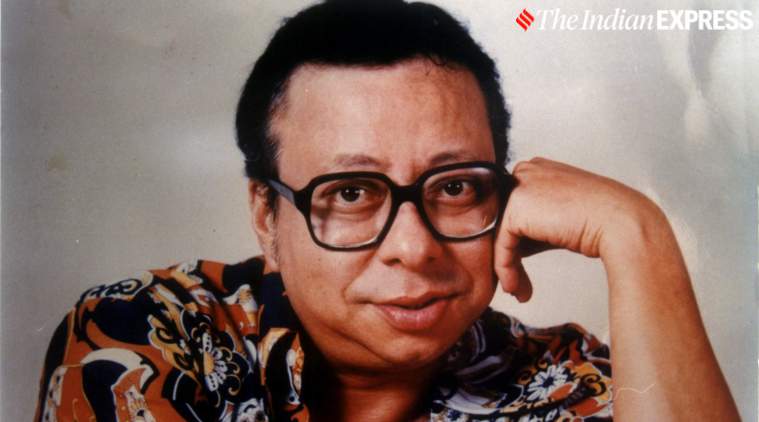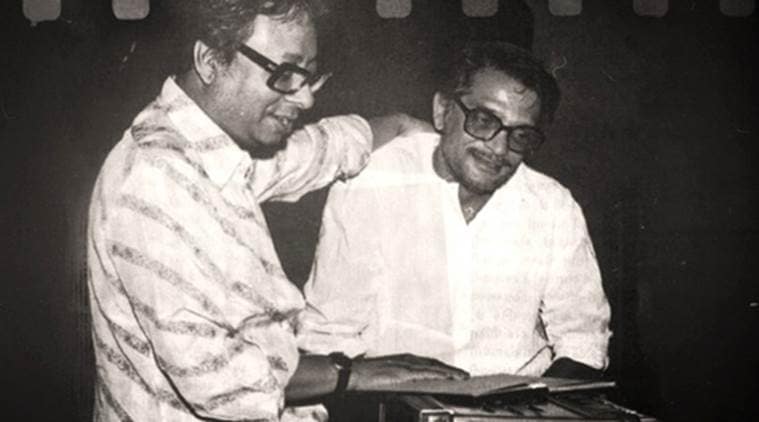 Music Director RD Burman is noted for introducing Western and retro beats into his music, making his work rebellious for its time. (Express archive photo)
Music Director RD Burman is noted for introducing Western and retro beats into his music, making his work rebellious for its time. (Express archive photo)
When RD Burman, whose 81st birth anniversary today will be celebrated with much musical fanfare by diehard fans (especially, radio channels: where would the RJs be without Pancham?), first met Gulzar both were working as assistants, their best years still ahead of them. Gulzar was five years older than RD Burman, lovingly nicknamed ‘Pancham’ by thespian Ashok Kumar. While Gulzar was assisting Bimal Roy, Pancham was learning under the tutelage of his father, the great music director SD Burman. Like Guru Dutt and Dev Anand before them, the two young men made a pact – if Gulzar ever turned director he would work with Burman. It didn’t take long for Gulzar to fulfil that promise. For his first directorial film Mere Apne, Gulzar enlisted the talent of Salil Chowdhury, one of the few music directors the sports-loving lyricist looked up to. One may recall that Pancham had declared Salil Chowdhury as one of his mentors. Soon, for his second film Parichay, Gulzar picked Burman, a work association unparalleled in Hindi cinema.
 Gulzar was five years older than RD Burman, lovingly nicknamed ‘Pancham’ by thespian Ashok Kumar.
Gulzar was five years older than RD Burman, lovingly nicknamed ‘Pancham’ by thespian Ashok Kumar.
According to senior music writer Raju Bharatan, Salil Chowdhury rated Burman “highly.” Bharatan writes in an online column that Chowdhury considered Burman as similar to him, “at all times innovative like me, at all times experimenting like me” and equated him with the all-time great composers of the past. Son of SD Burman, Pancham has been composing from an early age (reportedly, Senior Burman used his tune for Sar Jo Tera Chakraaye in Guru Dutt’s Pyaasa) but he had to wait until the 1960s for his breakout score, Shammi Kapoor-Vijay Anand’s musical thriller Teesri Manzil (1966). While Pancham is noted for introducing Western and retro beats into his music, making his work rebellious for its time, his corpus with Gulzar (largely from the 1970s and 80s) was irreverent, classical, experimental and traditional. In the work they produced together, you see a certain effortlessness and easy camaraderie that could be attributed to their off-screen friendship. According to Gulzar, as quoted in a Doordarshan interview once, “We had a very offbeat style of working. We would go out for drives and Pancham would come up with tunes simply by drumming up on the car’s steering wheel.” The musician’s many admirers remember him as an eccentric who could pound music even out of ordinary, household objects like bottles, cups and saucers.
When Burman passed away in 1994, Gulzar lamented that a part of his soul, too, went away with his departed friend. Years later, the still-grieving Gulzar found a Pancham replacement – a second soul-mate so to speak. That was Vishal Bhardwaj. To celebrate RD Burman’s 81st birth anniversary, we round up five songs from the Gulzar-Pancham combo that continue to captivate Hindi film music listeners.
Beeti Na Bitai Raina, Parichay (1972)
Inspired by the raga Yaman, Beeti Na Bitai Raina is a testament to Burman and Gulzar’s mastery over the Hindustani classic music. Starring a heavyweight cast of Pran, Jeetendra, Sanjeev Kumar and Jaya Bhaduri, Parichay was among the first Gulzar works centred on children. Music was intrinsic to its plot and Pancham brought Gulzar’s soulful and evocative poetry to life. The soundtrack also features the mystical Musafir Hoon Yaaro.
Tere Bina Zindagi Se, Aandhi (1975)
Gulzar’s poetic dirge to the complexities of human relationships, memories of past love, heartbreak and pain of separation, Tere Bina Zindagi Se is where Gulzar and RD are at the peak of their vast talents. Lata Mangeshkar lends her voice to Suchitra Sen with a touch of pathos while Kishore Kumar’s haunting melancholy blends seamlessly into Sanjeev Kumar’s tragic persona.
Aaj Kal Paaon, Ghar (1978)
Pancham-Gulzar at their soft, romantic best. The mellow soundtrack contrasts to the film’s hard-hitting narrative. Javed Akhtar once called SD Burman as a “minimalist.” In Ghar, son RD Burman displays the very art of minimalism, a talent he owes to his great father.
Do Naina Aur Ek Kahani, Masoom (1983)
To call Do Naina a simple lullaby would be both deceptive and misleading and a gross injustice to the profound life philosophies it contains. While Gulzar breaks new grounds in Hindi movie lyrics RD adorns the Masoom soundtrack with simple orchestration and small strokes.
Mera Kuch Samaan, Ijaazat (1988)
Mera Kuch Samaan is Gulzar’s poetic paean to memories and how people we once loved are never too far away from us. They reside in our cupboards, our letters, our homes, in our souls and our very fabric of being. When Mahender’s (Naseeruddin Shah) wife Sudha (Rekha) discovers old belongings of her husband’s ex-lover Maya (Anuradha Patel), she jealously sends them back to her. In response, Maya writes to Mahender with a list of unforgettable memories that he ought to return. They include the 116 moonlit nights spent together, the wet, rainy days, the twig from an autumnal tree she wore as earrings and the damp smell of henna. She wants everything back. She wants a lifetime of love and memories back. Asha Bhosle elevates the ditty to magical level. Written in free verse by Gulzar, it was a difficult song to set to tune. When Gulzar took the song to Pancham, he reportedly thundered, “Next, you will bring me the headline of Times of India and ask me to compose it.” Gulzar later recalled a strange coincidence. The 116 nights reference in the song turned out to be prophetic as that also happens to be the exact number of songs Gulzar and Pancham did together!
(Shaikh Ayaz is a writer and journalist based in Mumbai)